#temple of romulus
Explore tagged Tumblr posts
Text
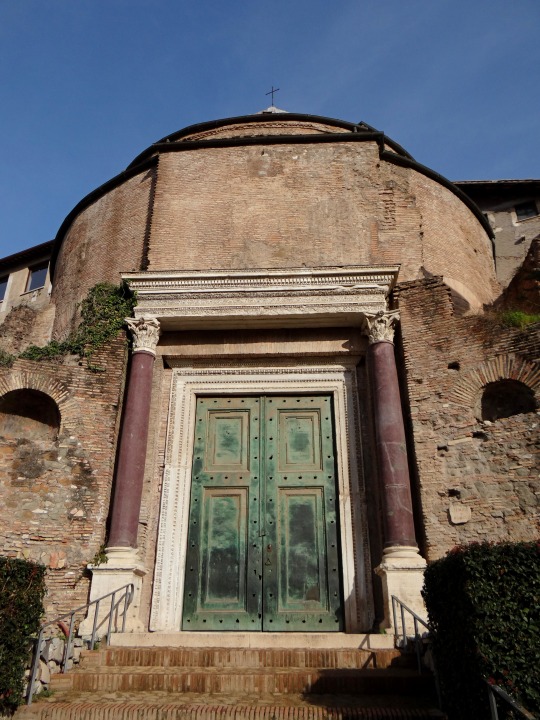
The Temple of Romulus in Rome's Imperial Forum. The temple survived because it was incorporated into a later Christian church.
#temple of romulus#ancient rome#ancient roman#ancient architecture#italia#italy#rome#roma#travel#photography#original photography#photographers on tumblr#lensblr#architecture#historical architecture#church#church architecture#urbanexploration#urban photography#wanderingjana
453 notes
·
View notes
Text












Italian Adventure travelogue paintings!
27: Circus Maximus, with the Imperial Palace overlooking. Rome.
28: Temple of Hercules, Rome.
29: Roman Forum, Rome.
30: House of Romulus, in the Roman Forum.
31: Garden of the house of the Vestal Virgins, in the Roman Forum.
32: Domus Aurea, Rome.
#circus maximus#temple of hercules#roman forum#house of romulus#house of the vestal virgins#domus aurea#rome#art#watercolor#painting#jojo seames#jojo's italian adventure 2024
5 notes
·
View notes
Text


By Jane von Mehren
11 January 2023
The highly civilized Etruscans had a huge impact on the city’s eventual geography, architecture, government, trade, and agriculture.
They created excellent schools to which rich Romans sent their sons, much as they would later send them to Greek institutes.
By the sixth century B.C., some of Rome’s most famous institutions, from the Forum to the Senate, were in existence but even the most reputable historians — including Fabius, Livy, and Plutarch — started their accounts of the empire in legend.
Legendary beginnings

The story of Rome’s founding begins in Alba Longa, the first “city” of Latium, a region in central western Italy, occupied by Latins.
The area had been inhabited since the Bronze Age by farming communities and was known to the ancient Greeks, which is perhaps why Aeneas, a Trojan prince, is said to have established it around 1150 B.C.
According to legend, in Alba Longa, two of Aeneas’s descendants, the brothers Amulius and Numitor, fought over who would rule.
Amulius triumphed, killing Numitor’s sons and exiling his daughter, Rhea Silvia, to become a Vestal Virgin.
Through divine intervention, she gave birth to the twins Romulus and Remus.
Threatened by these potential claimants to his throne, Amulius beheaded Rhea Silvia and abandoned the babies in the river Tiber.
Miraculously, a she-wolf rescued and cared for the boys until a shepherd, Faustulus, adopted them, raising them on the Palatine Hill, located in modern-day Rome.
The legend goes on to say that the brothers established the city of Rome on the banks of the Tiber River, where it was narrow enough for crossing and the hills provided a good defensive position.
The land between the hills, however, was quite marshy and not all that fertile.
The twins soon quarreled about the city’s exact boundaries and Romulus killed Remus.
Romulus, along with the outlaws and criminals he recruited, invited neighboring tribe the Sabines, who had resisted intermarrying with the Romans, to a fête.
During the merriment, Romulus raised his cloak signaling his men to seize and abduct the young Sabine women.
As the origin story goes, being Roman wives suited the women and they stopped the Sabine men from battling the Romans when they came to recapture them.
In the end the Sabines remained in Rome as part of the new city.
Influences in the area

Archaeological evidence tells us that Rome’s actual origins were less dramatic.
The first Romans were Latin farmers and shepherds living in small village huts on the Esquiline and Palatine hills.
The Sabines, a tribe living to the north, divided soon after the city’s founding, and some of them came south and united with Rome’s people.
Rome remained relatively primitive until the 600s B.C., when the Etruscans, who controlled a series of city-states to the north, began taking control of the city.
Kingdom of Rome

While modern scholars discount some of the accounts of ancient Roman historians, they agree that during the first phase of its history — from approximately 753 to 509 B.C. — Rome was ruled by kings.
According to these writers, Romulus was the first, succeeded by Numa Pompilius, a Sabine, and in 616 B.C., by an Etruscan named L. Tarquinius Priscus.
Kings had almost absolute power, serving as administrative, judicial, military, and religious leaders. A senate acted as an advisory council.
The king chose its members, who became known as patricians, from the city’s leading families.
Unlike later monarchs, Roman kingship was not inherited.
After a king died, there was a period known as an interregnum, when the Senate chose a new ruler, who was then elected by the people of Rome.
The king-elect needed to obtain approval of the gods and the imperium, the power to command, before assuming his throne.
Etruscan influences
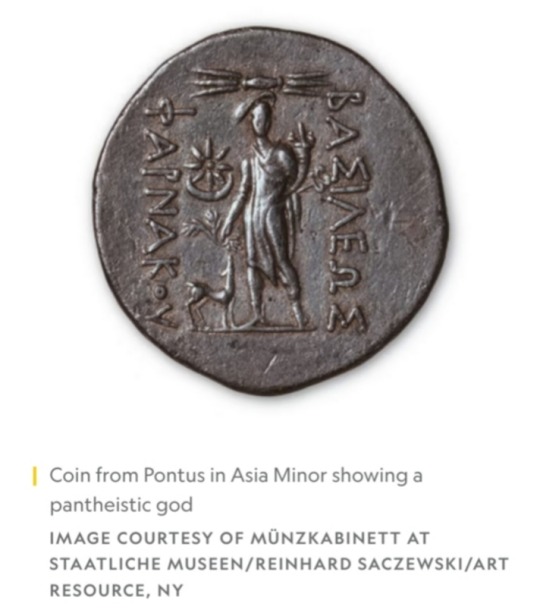
The Etruscans ruled a loose confederation of city- states that stretched from Bologna to the Bay of Naples.
It remains unclear where they originated, but they used a version of the Greek alphabet and some ancient sources describe them as coming from Asia Minor.
Around 650 B.C., they were already dominant in the region and took control of Rome, wanting its strategic position on the Tiber.
Under Etruscan kings, Rome grew from a series of villages into a proper city.
The Etruscans drained the marshes around the city, constructed underground sewers, laid out roads and bridges.
They established the cattle market, Forum Boarium, as well as Forum Romanum, the central market and meeting place that evolved into the heart of the empire.
Toward the end of this period of Etruscan influence, the first temple of Jupiter was built on the Capitoline Hill.
This temple, although rebuilt many times, became the symbol of Rome’s power.
Founding the Republic

The era of Roman kings ended in 509 B.C., when the Romans supposedly expelled the last Etruscan king, L. Tarquinius Superbus, in another mythicized event.
As recounted by historians, including Livy, the son of Tarquinius Superbus, Sextus, raped at knifepoint the noblewoman Lucretia, wife of the king’s great nephew.
Lucretia, feeling that her honor and virtue had been lost, committed suicide.
Her uncle Brutus swears to avenge her and commits to revolution and the expulsion of the monarchy.
To the Roman people, her story represents the tyrannical powers of the monarch on the state, and so the saga of Lucretia is cited as the event that spurred the Roman Republic into being.
In place of the monarchy, Romans established a republic, which lasted until 30 B.C.
Over the course of nearly five centuries, Rome became a dominant Western power, seizing territory throughout the Mediterranean, creating an enormous and efficient army, and learning how to administer its vast provinces.
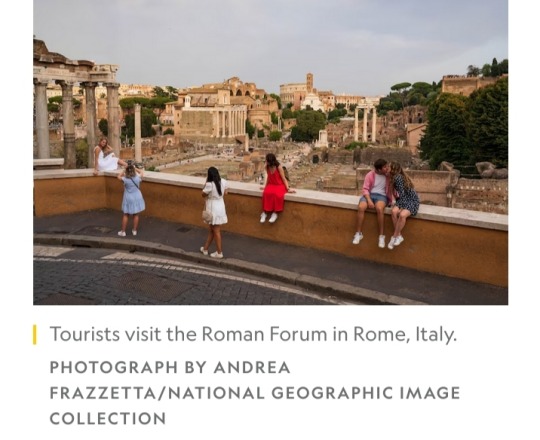
NOTE:
The traditional date for the founding of Rome is 21 April 753 BC.
#Rome#Ancient Rome#Romulus#Remus#Alba Longa#Latium#Italy#Aeneas#Amulius#Numitor#Rhea Silvia#Vestal Virgin#Faustulus#Palatine Hill#Tiber River#Sabines#Etruscans#Numa Pompilius#L. Tarquinius Priscus#interregnum#imperium#Forum Boarium#Forum Romanum#Capitoline Hill#Temple of Jupiter#L. Tarquinius Superbus
8 notes
·
View notes
Text
August Movie Review Catch-Up: The Heat Dissipates
August Movie Review Catch-Up: The Heat Dissipates
CREDIT: Warner Bros. Pictures (CREDIT: Screenshot) I saw a bunch of movies in August 2024 that I haven’t released my full thoughts about yet, as it’s been too hot to say too much about any one movie. So I waited until September in the hopes that it would cool down at least a little bit and that I wouldn’t overheat from all this film analysis. Continue reading August Movie Review Catch-Up: The…

View On WordPress
#Adria Arjona#Aileen Wu#Alex Neustaedter#Alia Shawkat#Alien: Romulus#Alison Pill#Amy Morton#Archie Renaux#Ariana Greenblatt#Ariel Donoghue#Édgar Ramírez#Barbara Hershey#Between the Temples#Blake Lively#Blink Twice#Bobby Lee#Borderlands#Brandon Sklenar#Cailee Spaeny#Carol Kane#Caroline Aaron#Cate Blanchett#Channing Tatum#Christian Slater#Daniel Betts#David Jonsson#Dolly de Leon#Ed Begley Jr.#Eli Roth#Fede Álvarez
0 notes
Text
Understanding Roman Legend

Numitor, king of Alba Longa, was dethroned and taken prisoner by his younger brother, Amulius, who, after killing his nephews, forced his niece Rhea Silvia to enter the temple of the Vestal Virgins so that she could not have offspring. But the god Mars and Rhea Silvia fell in love. Mars fathered the twins Romulus and Remus.

Mars and Rhea Silvia (1617) by Rubens. Liechtenstein Museum
Amulius, fearing that he would have two rivals in the future, ordered the newborns to be killed. The man in charge of the infanticide did not dare to do it but he placed the babies in a basket and left them to their fate in the Tiber River. The current carried the basket to a swamp called Velabrum, between the Palatine and Capitoline hills.
In the cave known as Lupercal they were suckled by a wolf called Luperca. According to Plutarch in 'Parallel Lives: Romulus', Luperca was the sacred animal of Mars.
Shortly afterwards they were found by the shepherd Faustulus, who was working for Amulius, so he knew very well who those babies were. He decided to secretly care for the children together with his wife Acca Larentia.

The Shepherd Faustulus bringing Romulus and Remus to his wife. Nicolas Mignard (1654) Dallas Museum of Art.
When they grew up did he reveal his true identity to them and they decided to do justice. They killed Amulius and freed their grandfather from prison, who was reinstated on his throne.
Why sons of Mars and not of another god or a king?


Mars was the god of war and the army, virility, violence, revenge, and courage: all these attributes was the essence of Ancient Rome, rather the Roman army.
On the other hand, if the twins had been the sons of a man, even a king or a great warrior, they would have been ordinary men. That was a clear message to the Romans: they were not like the others; their army was not to be one among many.
Why a she-wolf?

The first food was not mother's milk or the milk of a tame animal but of a fearsome predator; A powerful message to the Romans about who they were, where they came from and where they should go. Engendered by the war, fed by ferocity; Their duty was to always be aggressive and feared by their enemies. Roman soldiers remembered at every step: “ We are sons of Mars and the Capitoline she-wolf”. And Rome, like the she-wolf called Luperca, was also capable of protecting its allies.
The foundation of Rome

The twins left their hometown of Alba Longa as they wanted to rule without overthrowing their grandfather. Romulus wanted to build a new city called Rome on the Palatine Hill, but Remus wanted to call it Remoria on the Aventine Hill. They decided that whoever saw the most vultures would win the dispute. Remus saw six and Romulus twelve.
According to tradition, Romulus founded Rome by drawing its sacred border on the afternoon of 21 April 753 BC.
Romulus had declared that no one could cross the borders of the city in arms; his brother disobeyed and crossed the limits carrying a sword, thus violating the sanctity of Rome. Romulus became enraged and a heated argument and subsequent armed confrontation began between the twins. Remus was seriously wounded and died hours later. Romulus held a funeral for his brother and buried his remains at the place where Remus had wanted to found his city Remoria.
Why a story about twins?

Romulus and Remus (1615) by Rubens. Capitoline Museums
The fact that they were twins, and not an older and a younger brother, was to make it clear that the god Mars was the father of both, and that they were 100% brothers.
So there was no doubt that Romulus and Remus represented all Romans, both in good times, when they were united and fighting for a common cause, and in times of division and conflict.
The fratricide was not premeditated. The fight was not for ambition or for a woman, it was for Rome. This story taught that, for the good of Rome, civil wars could be fought, as many as necessary.

Romulus and Remus. Silver didrachm (6.44 g). c. 269–266 BC. Photo: Curtius http://creativecommons.org/licenses/by-sa/3.0/
80 notes
·
View notes
Text
Ancient Rome Sidequest Mapping
here's a post of something interesting I've found ages back, and posted on (X)Twitter, concerning the Ancient Rome Sidequest. needed to save this because I am nuking/closing my accounts there.
this is following Sasha and Grizzop's path step by step, and how, back then, the GM mastery made my jaw drop.
when describing the room (or more like a hall) in RQG126, it's mentioned being lit by braziers, and that Zop and Sasha fall down onto a mosaic floor, the same one which is broken in present time. the closest imagined restoration of the Ancient Rome including intricate mosaic? Domus Transitoria. It was Nero's first palace, which, according to Seutonius, spanned all the way from the Palatine to the Esquiline, and according to historians had floor and wall mosaics, and in these times mosaics were restricted to only being on walls and floors. when the palace was replaced by Domus Aurea, mosaics were instead placed onto the vaulted ceilings, changing the art of future and partially influencing future mosaic art. there is also a 'gardened avenue' towards temples, which fits the path Sasha and Grizzop take. not to mention that Templo di Apollo lies *very close* to Domus Transitoria (the previous statements are backed up by following articles, in Italian, because I couldn't find English ones that didn't butcher the things I wanted to show)

romanoimpero.com/2020/05/domus-transitoria-di-nerone.html https://romanoimpero.com/2010/09/tempio
they get into a temple district (temple of Diana and then down the Palatium towards Aventinus, with actual real life temples somewhat applicable to the ones we hear about in the podcast), and that's how they figure out that there are still corresponding gods in Rome. the distance between the temples described? that they 'don’t have any sort of distance between them, next to each other on the streets', unlike the modern ones; which makes sense as Palatine Hill is very... compact in the building placement, even in ancient times.
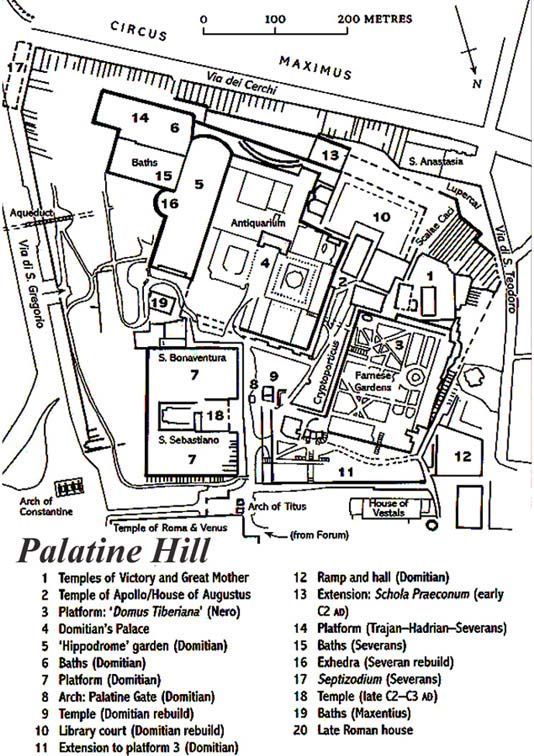
there isn't much left from the actual temples except from preserved ruins by Italian archelogists, but there are skilful, artful depictions of how temples could've looked like in ancient times, for example temples of Apollo and Cybele in Palatine:
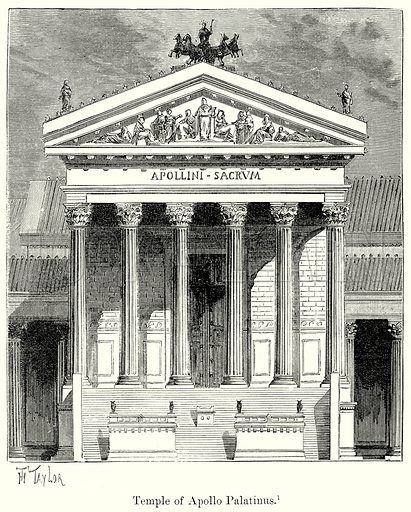

then we get to see the untouched Servian wall, which is then magicked by whoever is in charge (I don't think we get to know if that's just the Mars people, or several sources, or something else) to protect the city.

(Servian wall is in black here)
Servian wall is the first defence of the city of Rome, constructed around it in the early 4th century BCE. later on it would be succeeded by superior Aurelian walls; but by that moment in history (late 3rd century AD) in RQG that city did NOT exist as a bastion anymore. then, after they visit the temples of 'Pluto' (meet Cicero) and Mars, all three of them through the districts with human population, which corresponds to the parts close to Forum Romanum, also where, coincidentally, real life Cicero resided for some time!
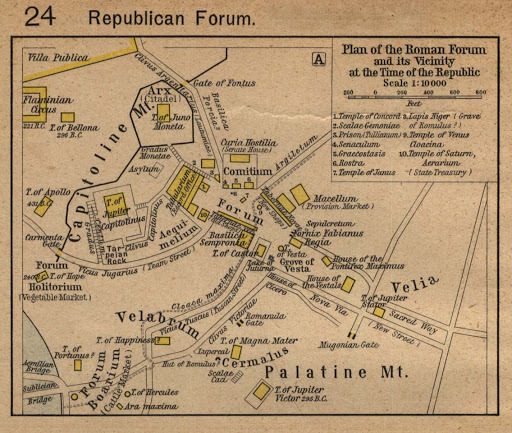
and then, Cicero takes Grizzop and Sasha down into the sewers, which makes perfect sense because that district is where the Cloaca Maxima goes through!! there are several historical suggestions about how the system was formed, from an open air canal into underground sewers. BUT! that isn't what is interesting to us! what is interesting is that the passage partially connects the temples, which makes sense, because in this case temples are also in need of water system for the non-godly treatment of their residents and patients.
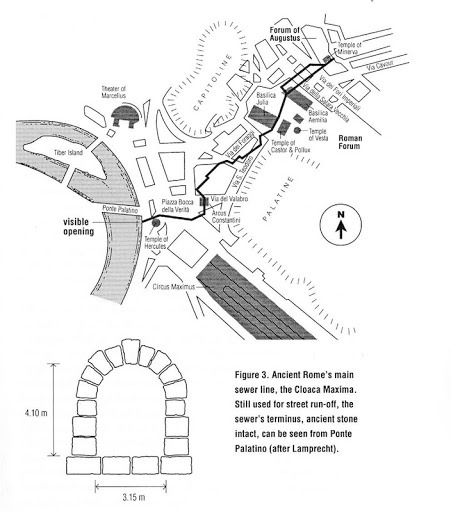
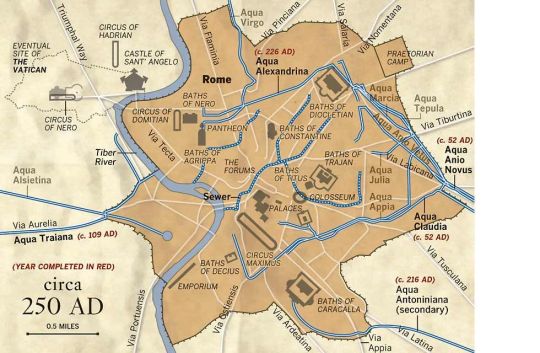
and then the three of them move towards the underground part/inner workings of temple of Jupiter, which, in fact, completely corresponds with position of the temple of Jupiter Stator!
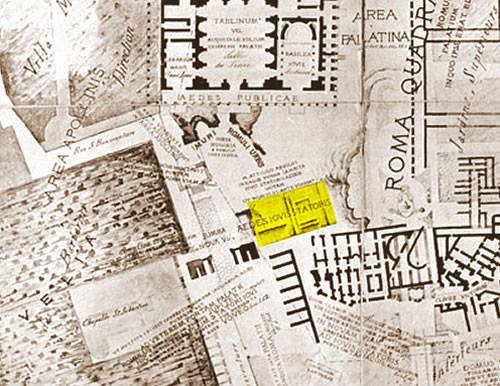
depicted here in yellow, information of it referenced per this article
per "Rambles in Rome", the temple of Jupiter Stator, vowed by Romulus when his army was fleeing before the Sabines, if Jupiter would stay their flight; hence the name. "Romulus built a temple to Jupiter near the Porta Mugonia" (Dionysius, ii. 30). It was restored by Scipio, A.U.C. 459 (Livy, x. 37). It was in this temple that Cicero made his first oration against Catiline (Plutarch). Cicero says that here the goods of Pompey were offered for sale.

Rambles in Rome, as referenced
and the temple of Jupiter Stator like a light walk away from where the Colosseum would stand. only there is no Colosseum. there is the domed hall in which the big Mars vs Jupiter battle happens, the other part of which they can't even see, being underground and so far away. then, as dragons escape and Sasha and Ciciero are free to go, they trace their steps back out the Cloaca Maxima until they reach dead end and have to reach outside to gatehouse near Pons Subilicus (the temporary bridge dated ~1AD), just outside Forum Boarium
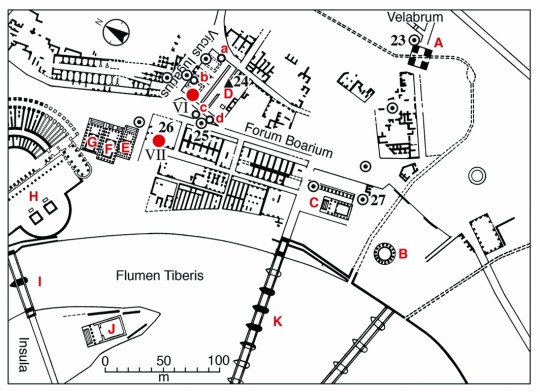
and that's why when they get out of the sewers they can 1) see the destruction of the walls 2) see the destruction of the palace in which Grizzop and Sasha were dropped 3) be only steps away from going away from inner city, while also technically being on Rome territory.
they have also, in my opinion, crossed Tiber afterwards and started going Northwest, because after some time it's mentioned that people flocking to necropolis, which, at that point, were on Trans Tiberim/more North and closer to Vatican/Campus Vaticanus, ergo, on the other side of Tiber.

"The Vaticanum, or Campus Vaticanus was originally a level area between the Vaticanus Mons and the Tiber. During the Republican era, it was an unwholesome site frequented by the destitute. Caligula and Nero used the area for chariot exercises, and renewal was encouraged by the building of the Circus of Nero, also known as the Circus Vaticanus or simply the Vaticanum. The location of tombs near the Circus Vaticanus is mentioned in a few late sources."
I am not in any way shape or form the One and True source on this, and will gladly take critique from people more versed in the topic than I am; this was made originally for my personal use, and then I figured out hey, this is really interesting! and also I wanted to save this for everyone else who used this for their musings/fics.
#Rusty Quill Gaming#RQG#RQG Ancient Rome Sidequest#RQ Gaming#Sasha Rackett#Grizzop drik acht Amsterdam#Ancient Rome Sidequest#RQG Cicero#text post#Varya rambles#long post
25 notes
·
View notes
Text
GIVE BRAIN A HORSE-- (I'm joining the horseposting, haha.)
---
“…Master Brain. What is that?”
Brain, for his part, didn’t seem particularly concerned with the situation. He wasn’t even looking at Sigurd, calmly petting the—the creature he’d apparently decided to lead into Headquarters. “A horse.”
“…Right. I…suppose I can see that.” Sigurd had the vague urge to rub his temples. Or shake Brain, maybe—but then, he supposed he probably wasn’t supposed to do that to a Union Leader, so vaguely-strained questioning would have to do. “And…why is it here?”
“Followed me.”
“From where?”
Brain finally looked at him and grinned, smile just a little too sharp for his liking. “Don’t worry about it.”
…He was going to have to file an incident report later, wasn’t he.
“Master Brain,” Sigurd said, trying very, very hard to keep his voice level and failing, “you didn’t…steal this, did you?”
“Not as far as you’re aware. Her name’s Lux, by the way.”
“Master Brain—”
“She belonged to Romulus and I owed Remus a favor.” Brain shrugged, like that was a normal thing to do, but Sigurd guessed he didn’t really know what the Union Leaders had done on their off-time. (It was such a strange image that it threw him for a moment. The Union Leaders, engaging in petty theft and pranks? It didn’t fit the image that had been built up in the stories.)
“What would Master Ephemer think,” Sigurd started, trying to get his train of thought back on track, “if he found out you’d stolen someone’s—”
“He’d help, probably.” Brain tilted his head, looking thoughtful. “Maybe not successfully.” Gently, he tugged on the horse’s halter, and it took Sigurd a moment to realize he was bringing her closer, wait no he didn’t know how to act around horses— “She’s not going to hurt you,” Brain said, face crinkling in amusement that seemed sincere rather than the strained sort of thing Sigurd usually saw. “Look, just pet her. She’s pretty gentle.”
The horse nosed his shoulder with a quiet snort, and Sigurd side-stepped a little, hands pulled in. It made her nervous, apparently, because she pulled her head back quickly, ears flicking and hooves tapping an unsteady sort of beat. Brain shushed her, and she calmed quickly, but Sigurd stared at her with trepidation.
…Of all the things the Union Leader had done, this was probably one of the strangest. He’d ditched meetings, harassed the Founders, and generally tried to stick his nose in places he probably shouldn’t, but those all felt some degree of normal. Frustrating, but Sigurd knew how to deal with that. He wasn’t sure he knew how to deal with a horse.
But he looks happy, something in the back of his mind whispered, and—so he did. Brain wasn’t watching him; his expression had gone soft, hand carefully stroking the horse’s muzzle. He looked more relaxed than Sigurd had ever seen him.
He could feel something in him crumbling, and he knew he was going to regret this later, but he sighed, his whole body sinking with the sound. “Well,” he said, resigned, “do we need to find somewhere to hide her?”
Brain glanced at him, head cocked and eyes narrowed.
“…We’re just taking her to the meeting, aren’t we.”
(It was almost worth the odd stares and whispers throughout the meeting to watch Brain introduce the horse to his new-found friends later. Almost.
The fact that Brain apparently didn’t know how to ride the horse, however, felt a little more vindicating.)
#kingdom hearts#kingdom hearts fanfic#khml#brain#sigurd#brain deserves a horse!!#...i DID think about drawing something instead#but uh. i can only draw One Thing#and i'm not sure a horse would fair too well with a bunch of dragons#...on the other hand. 'horse that ditched its knight to hunt dragons on its own' could be pretty funny#brain adopts it. it's entirely unwilling to be here#it keeps trying to fight him#brain thinks it's funny#everyone else is concerned
67 notes
·
View notes
Text
As the conspiracy reaches its finale, the Void Hunter joins the fight.
Uncover the Conspiracy in Zenless Zone Zero's All-New Version "A Storm of Falling Stars", S-Rank Agent Hoshimi Miyabi is here! With S-Rank Agent Asaba Harumasa Limited-Time Giveaway! Pre-register to obtain additional rewards.
731 notes
·
View notes
Note
"who doesn't remember this American history?" "americans." "well Americans are dumb anyways"
Well, to be fair it's not just Americans, it's pretty much every culture and society.
Take for example, my favorite history; Ancient Rome
Go back in time to the 2nd century and ask who founded and built Rome? - Romulus. Who founded the Senate? - Romulus. Who built the first temple? Romulus. Who created the Roman social system - Romulus. Surely Romulus didn't do all this stuff alone and surely early Roman history isn't just that simple. But societies have a way of distilling complex histories into simple, almost mythological narratives. Stuff that's complex, or embarrassing, or shameful just kind gets thrown to the wayside and forgotten.
55 notes
·
View notes
Text
The Fall of The Lamb
Hello hello! Alright I'm getting into angst territory with this one so if you don't like to cry, it's okay :D.
This was inspired by the works of @circuscountdowns , their COTL art has given me life and now you all get to read this bitter sweet story.
Also note that I did take some liberties with the lore of their interpretation and I might not be at all accurate with some detail's here. So please do not try to incorporate anything from this fic into anything that's 'cannon' because it's probably not. Maybe I got a few good guesses in but this isn't an official work by Circus.
With that out of the way-
TW: Eye squishing, blood, stabbing, death.
Narinder awoke on the stone floor of the temple with a jerk, his body back to normal and sore after his fight with Romulus. A groan as he sits up and wipes at his face, noting that he would probably have a few more scars to add to his collection. The wolf had been a surprisingly difficult opponent.
He had put up a good fight but in the end he had lost.
Narinder picked himself up and dusted off his robes, a shiny glint in the light catching his attention. Seeing the eyeball on the floor he grinned as he picked it up, a smug feeling as he crushed the eye in his palm and let the gore drop to the floor. At least he can take pride in knowing the wolf made it out injured, the Lamb had to be finished with him by now.
Ears flicked as Narinder searched for the sounds of the temple only to notice something.
The whole temple was quiet.
Something felt off. Wrong. There were no sounds of battle let alone any pained whimpering from a defeated wolf. Narinder wouldn’t admit it but he felt his own heart sink into his stomach and suddenly he was running. Running as he felt the heart in his chest pound a mile a minute as he took corners and ran through doors and soon came to the biggest room in the temple.
The Lamb had called it their sanctuary, the room having a large open skylight and built around the foliage like an open garden. While they did not hold sermons in this room it was often used as a place to pray and devote oneself.
Narinder stopped at the sight he came upon. The Lamb’s corpse was on the grassy floor having disintegrated into bones and cloth. The wolf stood nearby looking at his achievement as the red crown sat upon his head, his spear bloodied.
Suddenly Narinder’s heart slowed down and calmed itself, a sense of painful calmness swept over him. It seems that the time has finally come. They had both known the Lamb can’t be a god forever, that eventually someone would come along and usurp them. Narinder had accepted this fact a long time ago.
Composing himself the cat began to walk down the stairs, not taking his eyes off the large godly corpse in the center of the room. All the while the memories they shared together played in his head.
The first time meeting the Lamb after their beheading, how loyal they had become and how much he enjoyed their banter. The betrayal and pain. Further betrayal of rescuing his family without even consulting him.
But then there were the good memories. The ones where the Lamb managed to get under his skin and somehow claw their way into his heart. Aym and Baal being brought back to him. All the annoying little quirks that made him laugh. He almost chuckles at the memory of the Lamb soaked in ocean water and covered in seaweed from when Narinder threw them in the water.
First kisses and nights cuddled up in bed as they talked quietly. Private moments where the two couldn’t get enough of each other and even the ones where they argued. Of holding the Lamb as they wept.
Their wedding day. Oh how the Lamb had looked so beautiful in their robes, the jewelry on their neck and horns shone brilliantly in the light. What Narinder wouldn’t give to see them like that one more time.
His heart aches at the realization that this morning had been the last time he would see the Lamb alive. The last deep kiss between them. The last heartfelt words as they had laid in bed for just a bit longer than they should have.
The last, "I'll see you tonight, love!”
Of course it wouldn’t be the last of them being together in the end, but that didn’t stop it from hurting so much.
“Ha! Weeping for your fallen god, Witness?” The wolf barked at him as Narinder reached the last step, walking towards the Lamb’s remains.
“It is nature to be cyclical. Gods die not because they are weak but because they must.” Continuing to walk up to the ribs of his lover’s corpse it didn’t take him long to find what he had been looking for. Oh so carefully Narinder picked up the Lamb’s heart, still somewhat warm but no longer beating.
“Hey that’s-” Romulus took a step forward before Narinder cut him off.
“No. That crown may be yours by conquest….but this will always be mine.” Holding the heart against his own he relished in the feeling of it for a moment before walking deeper into the cavern of the ribs.
“Leave us now.” Narinder demanded while reaching over to break off a pointed bone.
“Tch-How can I trust you wont-”
“Leave us.” He demanded once more, his tone leaving no room for the wolf to argue. Not unless he wanted to start another fight. One Narinder knew the wolf would not live through.
Romulus stared for a good minute seemingly understanding what Narinder had intended to do, eventually turning away with a scoff. The crown weeping on his head. “Whatever.”
Alone for the final time Narinder settled down against a rib and once more looked into his memories. He could still see that annoying smile that he loved so much on that face. Still sees the eyes that were full of love for him.
It wouldn’t be long now before they were together again.
–
“I only want to remind you that, as I have seen your rise, I will gladly witness the fall.”
The Lamb’s skin was warm as his palm rested against their cheek, seeing that tear fall from their eye.
“You would stay with me through even that? Promise?”
–
“Promise.”
Giving the heart one last gentle squeeze before he lifted the pointed bone up in his hand, a tear falling down his cheek. With a final breath he plunged the bone into the heart he held and into his own. A pained grunt slipped out of his throat as well as more tears.
Leaning back fully against the bone he waited.
And soon he was seeing white.
The lands around him are just the same as they’ve ever been. Once his place of imprisonment now his new home. He no longer felt the heaviness of which the chains had held him here, no longer did he despise the after under his breath. No, it was beautiful and he felt as light as a feather.
A bleat had him snapping his head towards a figure, a figure dressed in the same robes they wore on their wedding day. Not willing to wait a moment longer, Narinder broke into a run, his own clothing being those from the same day.
“Narin-” The Lamb didn’t get a chance to say anymore as they were tackled, arms tightly around them as lips peppered their face and soon finding their lips. They couldn’t help the laughter as eventually Narinder pulled back just to look at them. “Hey hey it’s alright!” They soothed as the cat cried into their neck. “Why the waterworks, kitty? We knew this would happen. You promised me.”
“..Doesn’t mean it didn’t hurt stupid Lamb.” Narinder refused to let go and the Lamb didn’t try to pull him off.
“Ah. I’m sorry.” Their voice was beginning to sound as tight as Narinder’s, a tear falling down their own cheeks. They stayed like that for a long while, just holding each other.
Soon others had found them, Narinder’s family as well as their cultists.
And other lambs, goats and ewe's.
Hand in hand once more Narinder and the Lamb walked into the white fog, to be together again.
It’s said if you were to take a walk into an old temple, one that belonged to a Lamb you would find the bones of a god.
And if you took a closer look you would find the bones of one who has been said to have been devoted to the god.
So devoted in fact that you can feel it around you and if you leave a bundle of camellias you’ll be blessed with long lasting love of the deepest kind.
-----
Thank you for reading! Please like and reblog if you liked it : ) And please let me know if i missed any they/them pronouns, I get my words mixed up sometimes and I'll gladly fix it!
#cult of the lamb#narilamb#cotl lamb#cotl narinder#cotl#cotl fanfic#circuscountdowns#tw blood#tw gore#tw death
68 notes
·
View notes
Text
hellenic holidays
Holidays are an important part of Hellenic religious life across all of the Mediterranean– whether Greek or Roman. For the sake of modernity, relevant Graeco-Roman holidays will be adapted to the contemporary Gregorian Calendar.
Ianouarios (Latin: Ianuarius, Eng: January)
Kalends (January), Roman era, Gregorian calendar, January 1: First day of the New Year, in honour of Janus. Large celebrations done, and charity is highly encouraged. Prayers to Lord Asklepios also recommended.
Phebrouarios (Latin: Februarius, Eng: February)
Kalends (February), Roman era, Gregorian calendar, February 1: First day of the month.
Parentalia, Roman era, Gregorian calendar, February 13 – February 21: Literally “Ancestors Days” or “Days of the Ancestors”, Parentalia is the February festival celebrating the deceased ancestors of the family and the pater familias. They are offered flowers, wine-soaked bread, violets salt, and wheat. Often they are providing a true sacrificial banquet, but these are di inferni, spirits of the underworld. They are those who dwell below, and proper care must be made in sacrificing to them.
Anthesteria, Greek era, Gregorian calendar, February 19 – February 21: Athenian festivals dedicated to Dionysos and the dead.
Lupercalia, Roman era, Gregorian calendar, February 15: Holiday intended to avert evil spirits and miasma, as well as spread purification; which releases health and fertility.
Lesser Eleusinian Mysteries, Greek era, Gregorian calendar, February 17-23 (Sign of capricorn): Serves as reminders of the Greater Mysteries, in honour of Deo and Kore.
Martios (Latin: Martius, Eng: March)
Kalends (March), Roman era, Gregorian calendar, March 1: First day of the month.
Navigium Isidis, Hellenistic-era Egyptian, Gregorian calendar, March 5-6: Festival in honour of Isis marks the opening of the sailing season.
Dionysia, Greek era, Gregorian calendar, March 9 – 16: Holiday dedicated to Bacchus.
Liberalia, Roman era, Gregorian Calendar, March 17: Another holiday dedicated to Bacchus.
Hilaria, Roman era, Gregorian calendar, March 15 – March 28: Numerous day celebration dedicated to the Mother of the Gods and Her lover Attis/Gallus.
Quinquatrus, Roman era, Gregorian Calendar, March 19: When the Temple of Athene on the Aventine Hill was consecrated. Feast day to Athene.
Aprillios (Latin: Aprilis, Eng: April)
Kalends (April), Roman era, Gregorian calendar, April 1: First day of the month. Dedicated to Aphrodite.
Genéteira tis Rómis (Natale de Roma), Roman era, Gregorian calendar, April 21: Day commemorating the founding of Rome by Quirinus, known as Romulus when embodied in a mortal form.
Serapia, Hellenistic-era Egyptian, Gregorian calendar, April 25: Day commemorating Serapis, the ruler of the underworld.
Maïos (Latin: Maius Eng: May)
Kalends (May), Roman era, Gregorian calendar, May 1: First day of the month.
Lemuria, Roman era, Gregorian calendar, May 9, 11 and 13: A trio of solemn days for the malevolent and restless dead, for maintaining their memory is as paramount as those of the benevolent ancestors. Sacrifices are offered as propitiation in order to keep the peace and avoid ill luck from these infernal spirits.
Thargelia, Greek era, Gregorian calendar, May 22 – May 23: Celebration in honour of Artemis and Apollo.
Iounios (Latin: Iunius, Eng: June)
Kalends (June), Roman era, Gregorian calendar, June 1: First day of the month.
Flight of Aineías, June 11: According to calculations by Eratosthenes, today is the day the city of Troy was sacked in 1184 BCE. The burning of Troy would be the end of the Trojan War, but simultaneously it would be the birth of a new beginning. Ultimately, Troy’s fall would give rise to the eternal city of Rome centuries later, as many of those who laid the city’s foundations had been descendant of the Trojan refugees led by the pious Prince Aineías who fled the destruction, such as Aineías’ descendant Romulus. Today is a day that feasts should be held to commemorate the flight of Aineías and the survival of our ancestors, but simultaneously a day of mourning for those innocent who perished, whether during the Trojan War or any war.
Prometheia, Greek era, Gregorian calendar, June 17th: Festival dedicated to Prometheus bestowing reason to mankind.
Vestalia, Roman era, Gregorian calendar, June 7th – 15th: Festival specifically in honor of the Goddess of the house, Vesta, and the spirits of the store chambers, cupboards, and the penates.
Death of Julian, Roman era, Gregorian calendar, June 28th: Mourning day marking the death of the divine Julian.
Ioulios (Latin: Iulius, Eng: July)
Kalends (July), Roman era, Gregorian calendar, July 1: First day of the month.
Panathenaia, Greek era, Gregorian calendar, July 17-24: https://sites.google.com/site/hellenionstemenos/Home/festivals/panathenaia-ta-mikra
Neptunalia, Roman era, Gregorian calendar, July 23: Held in honour of Poseidon. Plea for rain.
Augoustos (Latin: Augustus, Eng: August)
Kalends (August), Roman era, Gregorian calendar, August 1: First day of the month.
Sol Indiges, Roman era, Gregorian calendar, August 9: Minor holiday to King Helios where sacrifice is offered.
Vinalia Rustica, Gregorian calendar, August 19: A rustic harvest festival dedicated to Zeus and Aphrodite, celebrating the grape harvest, vegetable growth and fertility
Vulcanalia, Roman era, Gregorian calendar, August 23: A propitiatory sacrifice during the hot month of August to Hephaistos (Vulcan) in order to protect the home and livelihood from the ravages of fire. Traditional practices include sacrificing small fish into bonfires so that humans would not be harmed.
Septembrios (Latin: September, Eng: September)
Kalends (September), Roman era, Gregorian calendar, September 1: First day of the month. Ceremonies dedicated to Jupiter Tonans (“the Thunderer”) on the Capitolium, and Juno Regina on the Aventine.
Greater Eleusinian Mysteries, Greek era, Gregorian calendar, September 6-12 (Sign of cancer): In honour of Deo and Kore. Called great when the Goddess departs, (At least, the other equinox is in mythology the time of the kidnap of Kore, which is the descent of the souls.)
Apollo Campus Martius, Roman era, Gregorian calendar, September 23: Anniversary of the rededication of the Temple of Apollo in the Campus Martius; Leto is also honored
Oktôbrios (Latin: October, Eng: October)
Kalends (October), Roman era, Gregorian calendar, October 1: First day of the month. Dedicated to the deity Pistis (Fides in Latin).
Thesmophoria, Greek era, Gregorian calendar, October 2-4:
Khalkeia, ancient Hellenistic, Gregorian calendar, October 7:
Noembrios (Latin: November, Eng: November)
Kalends (November), Roman era, Gregorian calendar, November 1: First day of the month.
Feastday of Julian, Later Roman era, Gregorian calendar, November 8: Feast day dedicated to the coronation of Flavius Claudius Iulianus Augustus, the great reformer of Hellenism, as Caesar of the west.
Dekembrios (Latin: December, Eng: December)
Kalends (December), Roman era, Gregorian calendar, December 1: First day of the month. Dedicated to Poseidon and Pietas.
Saturnalia, Roman era, Gregorian calendar, December 17-23rd: Festivals that goes on for numerous days in celebration of the Winter Solstice with a particular focus on the golden age of Saturn.
Opalia, Roman era, Gregorian calendar, December 19: Festival in honour of Ops
Dies Natalis Solis Invicti, Later Roman era, Gregorian calendar, December 25th: Winter Solstice celebration dedicated to the birthday of God.
#source hellenicfaith#hellenic polytheism#hellenic#hellenic pagan#hellenic holidays#paganism#deity worship#roman deities#greek deities
16 notes
·
View notes
Text
Ladies, gentlemen, everyone in between and out. I’d like to introduce to you two beloved PJO God ocs which SHOULDVE BEEN IN THE BOOKS BC THEYRE IMPORTANT GRECO-ROMAN MYTHOLOGICAL PEOPLE
So, what people dont know about Romulus is that he has a wife, and a badass one at that (she saved a kingdom by throwing herself in between— but thats a story for another post)
And like a lot of other male demigods who became gods, Romulus didn’t have a choice in whether he could die and go to the underworld. A storm brewed and Mars picked him up, set him on fire to burn his mortal side away, and brought him to Olympus.
Rome was in shambles after that, and Hersilia: his queen was not in the best of moods. She coronated her son to be king, and was guided by Iris to go to a temple, she hadnt seen this temple before. She walks in and sees a statue of her husband, and there was a glass of ambrosia on the stone, she picked it and drank it, successfully being his goddess queen.
(Ovid’s Metamorphosis)
Now they took different names: Romulus - Quirinus
Hersilia - Hora Quirini
And Quirinus was a part of the Archaic Triad, which was Jupiter + Mars + Quirinus. In which they governed the best of Rome. Later Quirinus got replaced with Juno/Mercury/Minerva.
And honestly, if they ever bring back Rome�� or Camp Jupiter, there should definitely be an emphasis on that, bc yes he did become a god.
Anyway to my OC part:
Quirinus, Patron god of Rome, God of Rome, also known as “The Protector”. Sub-War deity and also god of flowers.
Unlike other gods, he chose his godly abode to remain in Italy. He dresses like a man from the 1980s, and is more business like. Of course now he’s technically the god of… Italia. He still lives because Romulus is still an important figure.
He’s sophisticated and doesn’t like to get involved with many things, as he trusts Rome is best on its own, and he’s right. Though during Tyrant’s Tomb, he was having a panic attack every two seconds. I will make a blog for him because yes.
Hora Quirini, mainly known as Hora. The patron goddess of Rome, a minor deity of time, the goddess of balance and of course, the queen to Quirinus. She dresses in black or white dresses, to often match his silly little style. She’s very very kind, and loves spending time with their family. Though, due to her become a goddess after she could give birth— she could never reproduce as a goddess, thats why she treats the children of Rome as hers. She also doesn’t mingle with Rome much, but she likes to do good things, and let the Romans believe their godly parent did it. I love her, she’s my pookie. Oh and she’s technically also a sub-goddess of war too.
(if anyone wanna rp her, pls tell me)


#percy jackson#pjo#ares pjo#ares#ancient greek mythology#ancient roman#rome#roman mythology#mars#mars pjo#romulus quirinus#romulus and remus#hersilia#hora quirini
8 notes
·
View notes
Note
I love your username. As soon as I saw it it made me laugh and hear Ezio’s voice in my mind when he falls off while doing those Templar lairs, something I heard many times in my playthrough of the game lol.
thank you so much 😭
ezio's lines in the templar lairs always stuck out to me as kinda odd and out of place. i think it's because, unlike it's descendants, ac 1 and 2 didn't have the protagonist talking to themself or voicing their thoughts.
then brotherhood happened and ezio is making little comments about "omg! parkour shortcut!" in the temples of romulus or whatever they were about. it just felt ODD but it was peak comedy to me. i love it so bad though.
fav part is when he makes a parkour shortcut statement in front of leonardo who is just like "yeah, that's one way of viewing this fascinating architecture i guess."
#asscreed#assassins creed#assassin's creed#assassinscreedseries#ac brotherhood#ezio auditore da firenze#ezio auditore
39 notes
·
View notes
Text

🌼🏵️🌼🏵️☀️🏵️🌼🏵️🌼 Green Man, May Day and May Pole
The Goddess of what is now May Day goes back to ancient times, in Anatolia, Greece, and Rome. Spring goddesses came to be venerated at two Roman holiday festivals that led to our May Day. The Roman Empire is important here because it took over much of Europe and the British Isles. Its mythology, associated rituals, and holidays spread there and merged with local conditions, mythologies, holidays, and customs.
The first of these goddesses of spring holidays was the Hilaria festival (from Greek hilareia/hilaria (“rejoicing”) and Latin hilaris (“cheerful”), held between the vernal equinox and April 1. It goes back to when the Phrygian goddess Cybele was introduced to Rome, at the end of the 3rd century BCE. In her myth, she had a son-lover, Attis, a dying-and-rising god who was mortally gored by a boar. Cybele knew that he had not died for eternity but that his spirit simply had taken refuge in a tree for the winter, and that he would be reborn from the tree in the spring, on the vernal equinox. When Cybele was introduced in Rome, she was given her temple of Magna Mater on the Palatine hill and a also a holiday with corresponding rituals. In her festival, a pine tree (that of Attis) was cut and stripped of its branches, wrapped in linen like a mummy, and decorated with violets (Cybele’s flower, because in the myth violets were said to have sprung from the blood of Attis).
It was then brought before Cybele’s temple on wagons in what resembled a funeral cortege, since Attis was “dead” inside the tree. This was followed by days of frenzied grief and mourning (including scourging) known as the “blood days,” when the tree was symbolically buried in a “tomb.” Attis then resurrected (rose out of the tree) on the day of Hilaria and was reunited with Cybele, symbolizing the beginning of spring. The tree was then erected before Cybele’s temple, and the people celebrated around it. The celebrations ended on April 1, which may be the origin of our April Fool’s day (the people were having a “hilarious” celebration). This has obvious parallels with the Maypole and May Day celebrations.
The second of these holidays was the Floralia, named after Flora, goddess of flowers and spring. Originally she may have been a Sabine goddess, about whom we know nothing other than that she had a spring month named after her on the Sabine calendar (Flusalis, linguistically related to Floralia) and that supposedly an altar to her in Rome was established by the Sabine king Tatius during the legendary period of his joint rule of Rome with Romulus. But none of her Sabine mythology has survived. In Rome Flora acquired her entire surviving mythology from the Greek spring goddess Chloris (from chloros – “pale green”),
who, as Ovid tells us, was originally a beautiful nymph in the Elysian Fields catering to the pleasures of the fortunate dead. There she also attracted the attention of Zephryos, the god of the West Wind and of spring, who quickly had his way with her. But then he married her, in what turned out to be a happy, loving marriage. As a wedding gift he filled her fields (her dowry in the marriage) with a flower garden, the flowers in which were said to spring from the wounds of Attis and Adonis. Zephyros, as the West Wind, brings the spring rains that grow the flowers. Thus, Virgil wrote that “the meadows ungirdle to Zephyros’s balmy breeze; the tender moisture avails for all.” Chloris also bore from Zephryos a son, Karpos, in Greek meaning “fruit” or “crop.” Through Zephyros’s wedding gift she became the goddess having jurisdiction over flowers, which she spread (by spreading their seeds) all over the earth, which until then was monochrome. She became goddess of spring. As Flora in Rome, in the late 3rd century BCE a festival was instituted in her honor that lasted from April 28 to May 2. It included theater, a sacrifice to Flora, a procession in which a statue of Flora was carried, as well as competitive events and other spectacles at the Circus Maximus. One of these involved releasing captured hares and goats (both noted for their fertility) into the Circus, and scattering beans, vetches, and lupins (all fertility symbols) into the crowd. The celebrants wore multi-colored clothing symbolizing flowers and spring, as later was customary on May Day in Europe. It was a time of generally licentious behavior. Flora also had a rose festival on May 23.
Holy Marriage Beltane can be seen as the feast of Holy Marriage or else as the feast of fertilization in nature. The Goddess is at her best in an array of flowers and flowers. The God is green and horned. This marriage takes place in nature around us, it takes place between the God and the Goddess, between man and woman, but it is also an inner marriage of the male and female energies within you. This is the feast of the actual cosmic orgasm, which is only achieved in complete indolence or in complete unification. It is the mixing of the red stream of the Goddess, with the white stream of the god. At the most plastic this is (menstruation) blood and semen. But it is also the descending and ascending, the incoming and outgoing energy flow. When these currents are in harmony with each other, unification arises and thereby fertility and creativity.
The Goddess by Talon Abraxas
17 notes
·
View notes
Text
OC Series - Sir Romulus and Sir Sigurd

Romulus and Sigurd were another example of putting a face on a faction. They act as stand-ins for the two most common recruits to the Dragon Cult.
Romulus (left) was a Leyndell orphan taken in by the Cult, eventually joining as a squire when he was old enough. Sigurd (right) was a younger son of Leyndell nobility, with several brothers in line to inherit ahead of him. He joined the Dragon Cult for a chance to make something of himself apart from his family.
Lansseax and Godwyn formed the Cult with an eye towards reforming the Golden Order, eschewing both the savagery of the Conquest Era knightly orders (Crucible Knights, Drake Knights, etc) as well as the toothless decadence of the modern Leyndell nobility. One could point out that Lansseax drew a great deal of inspiration from the chivalric ideals of the Carian Knights -- although with the entire endeavor plated in gold and sanctioned by Crown Prince Godwyn, few would push the comparison too far.
While the orthodox prize doctrine and the fundamentalists prize cold reason, the Dragon Cult emphasizes action. They style themselves as defenders of the people of Leyndell, whether that be by fighting against local threats or by feeding and sheltering the city's destitute.
While the Dragon Cult had never marched to war prior to the events of Prince of Death, the occasional local threat (bandits, feral dragons, or the like) did require their intervention, in which case Sigurd typically led the away team. He hailed from a family of knights and soldiers, with a particular specialty for siege weaponry. Romulus, a child of Leyndell's slums, led the Temple Guard.
18 notes
·
View notes
Text

Roman Coin - Copper Nummus of Romulus Caesar
Obverse: naked head of Romulus on the right. DIVO ROMVLO N V BIS CONS. Reverse: circular domed temple with half-open doors, surmounted by an eagle standing right, turning its head to the left. AETERNAE MEMORIAE// RQ.
Romulus Augustus (c. 465? – after 511), nicknamed Augustulus, was Roman emperor of the West from 31 October 475 until 4 September 476. Romulus was placed on the imperial throne by his father, the magister militum Orestes, and, at that time still a minor, was little more than a figurehead for his father. After Romulus ruled for just ten months, the barbarian general Odoacer defeated and killed Orestes and deposed Romulus. As Odoacer did not proclaim any successor, Romulus is typically regarded as the last Western Roman emperor, his deposition marking the end of the Western Roman Empire as a political entity, despite the fact that Julius Nepos would continue to be recognised as the western emperor by the east. The deposition of Romulus Augustulus is also sometimes used by historians to mark the transition from antiquity to the medieval period.
#Emperor Romulus Augustus#Roman Coin - Copper Nummus of Romulus Caesar#coins#collectable coins#roman coin#ancient artifacts#archeology#archeolgst#history#history news#ancient history#ancient culture#ancient civilizations#ancient rome#roman history#roman empire#roman emperor#roman art
35 notes
·
View notes
Text
Pray To Me A Little Longer (pt 2.1/3)
yeah, I'm splitting chapter 2 into two parts, the whole point of posting on tumblr (for me) is to be able to post things before they're ready for AO3, besides, it makes perfect sense as its own chapter
Part 1 • Part 2.2 Part 3 Devotion
Word count: 1788
Rating: Teen
Pairings: Moceit, future qpr Intrulogince (Remus/Logan, Logan/Roman)
Warnings: murder (comical), mythology-esc hijinks, animal death (by other animals, sentient animals? sentient animals killing non-sentient animals for food)
~~~START~~~
Long ago, near the dawn of humanity, Thomas, King of all Gods, had a Son: Patton, Prince of Gods, Flame of the Earth. He grew tall and fair, and when He had grown old enough to come into His own, Thomas had a second Son.
Romulus was a rascal of a God, full of wild energy and teasing jests. Many a God privately expressed Their regret that Thomas had had a second Son, though never would They say a word against Him in the presence of His Father. Still though, Thomas knew His second Son was a handful, and when He had a third, He sent Him to be raised in Logos, where His most trusted priestesses and nymphs would keep Him out of trouble.
One day, Patton came to His Father with a snake draped around His neck. The serpent spoke mostly riddles and lies, but still, the God of Truth professed His love for the creature and begged His Father to grant him the divinity His own Children had been blessed with. Thomas agreed, saying that if the snake would stay with Patton until the solstice in one month’s time, then the two should be wed, and the snake would be blessed to remain at Patton’s side forever more. The serpent happily acquiesced.
The serpent’s loyalty in that month was surely tested as Romulus teased the poor creature cruelly, calling him ugly and attempting to pry scales from his tail. Patton had always tried to show His Brother patience and kindness, but this disrespect of His lover was something He could not stand for. He cursed at His Brother, and bid Him not come to the wedding at all unless it was to beg on His knees for the serpent’s forgiveness. Romulus was not cowed and declared that the snake would just as likely leave His Brother after receiving divinity as not before storming off in a huff.
Thomas made His second Son apologize at the wedding, but nothing could stop the God of Ego from laughing when it was revealed that His Brother’s Husband’s name was Janus.
Janus continued to accept every jab, every aggression, every abuse from Romulus with a sly smile on His face. At every turn He held His Husband back from losing His temper at His Brother. Then, during the Festival of the Eclipse, as the moon passed in front of the sun, plunging the world into darkness, the God of Secrets pulled out an axe and cleaved His Brother-in-law in twain.
From the right half of Romulus’s body grew Roman, God of Romance, Music, Theater, and Literature, and from the left half grew Remus, God of Sex, Sculpture, Painting, and Weaving. The sun and the moon, separated once more.
The other Gods, while now more mistrustful of Janus — though none would say so, lest they face the unrestrained wrath of either Janus or His Husband — were pleased with this change.
After that, almost all of Romulus’s temples were added on to so that Roman and Remus each had their own shrine and new temples were built, leaving out Romulus’s shrine altogether, though they did still have a common shrine where priestesses and disciples alike could pray to both Gods at once.
Despite the fact that it had stood abandoned for years, the Lykos temple — which lay in the middle of the woods of the same name — was Roman’s favorite temple. It had been the spiritual center of Romulus’s cult during His time, and even now, it was still the home of Romulus’s sacred wolf pack.
Running with the wolf pack was one of Roman’s favorite things to do. He loved the dirt beneath His paws, the wind running through His white fur, and the feeling of taking down prey with His sharp teeth.
But most of all, He loved getting to take a break from being a God; wolves didn’t care about Gods, wolves cared about their pack, and their hunt. And of course, when Roman decided to take time to run with the pack, for a night at least, Remus came too — it was just as much His pack as it was Roman’s.
So Roman and Remus ran with the wolf pack through Lykos.
Roman prowled forward slowly, carefully, the deer He was stalking had no idea of its danger. It was a large stag, with mighty antlers and its fair share of battle scars; a kill like that would feed the pack well — Roman and Remus did not need to eat such mortal fodder, but there was something incredibly satisfying about it.
Roman was almost close enough to pounce when Remus came thundering up behind Him. The stag, having obviously heard the ruckus, took off running.
“REMUS!” Roman barked unhappily, but Remus just laughed as he continued after the stag.
Roman shook His head. Wolves were not pursuit predators, but of course, Remus could hunt however He liked.
A howl went up in the opposite direction than Remus had gone, signifying that another member of the pack had made a kill and was inviting the rest of the pack to indulge with them. Roman continued the howl, but did not move to join them — he preferred meat slayed by his own teeth and claws.
A few minutes later, He heard Remus howl His victory over the stag. He heard a few other wolves moving in Remus’s direction to share His kill with Him, but still, Roman continued to search for His own prey. Preferably, He’d find something before Remus decided to ‘help’ Him again.
A rabbit ran across His path, but it was small, and Roman was not interested in so weak a challenge. He crept on until he found a doe drinking from a stream. She was not as big as the stag, but she would do.
Roman stalked closer, keeping a careful ear out for signs of Remus’s less-than-graceful approach. Just as Roman was about to pounce, the doe seemed to catch wind of Him, she tried to take off running just as the stag had, but it was too late, and Roman quickly took her down. She struggled a little, but as Roman tore at her throat, her struggles lessened until finally, she was still.
Roman howled out His own kill, and relished the answering howls that came back. A mother wolf appeared then with her two cubs, and Roman graciously allowed them first pick.
As the mother and cubs ate, Roman noticed for the first time that there seemed to be quite a few birds in the trees. Birds were normal, as far as Roman could tell, there were birds everywhere, but He had never noticed so many diurnal birds out at night before.
Scavengers, perhaps, except that even when the mother and cubs moved away from the felled doe to allow Roman His fill, the birds made no move to approach the carcass.
Roman tore chunks of savory meat from the doe, and as no other wolves had appeared to share in His kill, He ate until a sharp feeling, almost like that of an axe, struck Him — it was not a physical blow, but it still managed to knock some of the wind out of him.
The birds seemed to sense the change too, as they suddenly all at once took to the skies, cawing and clamoring as they went. Roman was too stunned to pay them much mind — someone had entered His temple.
Another God had the audacity to enter one of Roman and Remus’s temples uninvited.
“The nerve of some people,” Remus sniffed, jogging through the woods until He was at Roman’s side. “Don’t Gods have any manners?”
Roman rolled his eyes at the question. Remus had a habit of entering other Gods’ temples to annoy Them — He was lucky that Janus seemed to like Him, otherwise Patton might have smote Him long ago. His favorite target was the God of Wisdom, but so far, said God had yet to rise to the challenge, though if He thought ignoring Remus would work, perhaps He was not as wise as He ought to be.
It was hard to pinpoint which temple the intruder was in since, as far as Roman knew, They were in Romulus’s shrine. If this God had gone into one of Roman’s shrines, or one of Their common shrines, then He would be able to find Them, but as it stood, all He knew was that there was a God in one of Their temples somewhere. Not the most helpful lead.
“Well?” Remus asked, having had waited for Roman to collect His thoughts while He scratched His own mangy fur against a tree. He did not care as much about intruders.
“They’re somewhere,” Roman concluded, unhelpfully.
“Great! Well I vote that we don’t worry about it. Maybe it’s Janny, vandalizing one of Romulus’s statues for fun!” Remus shrugged His shoulders as well as a wolf could do.
“Maybe,” Roman agreed tentatively. Janus’s feud with Romulus seemed to have ended with His forced mitosis, but perhaps the God of Lies had felt the need to blow off some steam.
Roman tried to shake off the odd feeling of having a God in Their temple and continue the hunt with the rest of the pack, but that feeling was always there, in the back of his mind. When at last the pack had eaten their share and stretched their legs, the two Gods accompanied them back to the temple where they denned.
They had been intending to leave after that, but intriguingly, They found a God, asleep, beneath Romulus’s citrus tree.
Roman had never seen this God before, and he knew most of the rest of His fellow Gods very well. That wasn’t to say that there weren’t Gods that Roman didn’t know, just that it was uncommon.
Remus sniffed the other God curiously. “Why’s he dressed like a human?” He asked, wrinkling His nose, which came across as more of a snarl on His wolf muzzle.
“That’s what you’re focused on?” Roman yipped. “Why is He in Our temple? And why is He sleeping here?”
“Probably explains the birds at least,” Remus shrugged once more, before seemingly making up His mind and curling up on the intruding God’s left.
Birds? Roman wondered before suddenly remembering the crows. The birds had come with the God, though why, Roman didn’t know — it wasn’t like peacocks followed Him around.
“Why are you sleeping with Him anyway?” Roman demanded.
“Warm.” Was Remus’s only answer.
Roman sniffed suspiciously at the other God for another moment before He was forced to admit, Remus looked comfortable and He was jealous. He curled up on the God’s other side, and He had to admit, it was comfortable.
~~~END~~~
I’m sick and I would like some serotonin pls 🥺
Docs did not like how I was spelling “axe” to the point where I needed to google axe to make sure I was right. I don’t know what it wanted from me smh
General taglist:
@royalty-of-all-things-snuggly @pixelated-pineapple @arsonic-knight @misunderstood-shadowling
#ts sanders sides#sanders sides#roman sanders#remus sanders#patton sanders#janus sanders#logan sanders#moceit#intrulogical#logince#to worship at your altar#gods au#thursday writes#my writing#sanders sides fanfiction
13 notes
·
View notes
Text
As the conspiracy reaches its finale, the Void Hunter joins the fight.
Uncover the Conspiracy in Zenless Zone Zero's All-New Version "A Storm of Falling Stars", S-Rank Agent Hoshimi Miyabi is here! With S-Rank Agent Asaba Harumasa Limited-Time Giveaway! Pre-register to obtain additional rewards.
731 notes
·
View notes